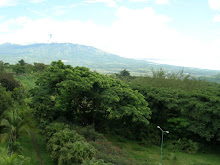One of the places I visited on our new year journey was Merapi.
Being there, seeing the bunker where two people were 'trapped' few
months ago. According to the people there, the bunker was built to
protect people from 'hot cloud', not from vulcanic material. Hence
when facing vulcanic material, it was not a safe place.
Fyi, last year the meteological body predicted that Merapi would be
erupted, while Mbah Maridjan, known as the 'juru kunci' -- key keeper
-- of Merapi said it would not. And it turned out that it was not
erupted.
Listening to the local people, how they explained Merapi as an unseen
kingdom, where the palace is, where the road is, etc made me wonder. As non-scientific as it might sound (I must confess: it didn't sound
scientific at all to me), isn't there wisdom behind it?
Isn't their belief a result of observations for many generations? When
they said not to build anything in a specific place (they said it's
the palace of the unseen kingdom), isn't it because they know IF
Merapi erupts, that's where the lava passes?
Should we, when studying and learning about scientific knowledge,
abandon this kind of wisdom?
Subscribe to:
Post Comments (Atom)

3 comments:
Precisely the conclusion I came after that thought.
we learn more from the fact rather than the scientific stuff.
i do believe in it..
Observation to understand facts is part of research, isn't it?
Post a Comment